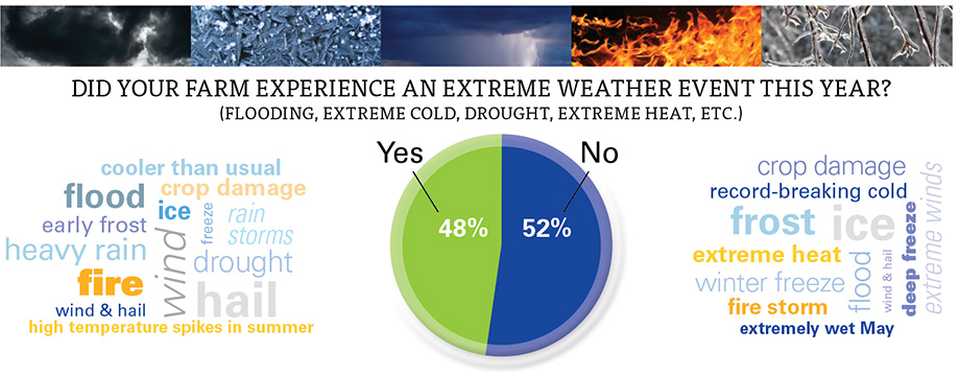What Has Fruit Growers Fired up? Climate Change and GMOs
 And you thought growers could go on and on about problems with the weather, or their employees, or any of a number of issues they deal with on a day-to-day basis? That was nothing compared to the flood of responses to American Fruit Grower’s annual State of the Industry survey on man-made climate change and, to a lesser degree, the production of crops that have been genetically modified in a lab.
And you thought growers could go on and on about problems with the weather, or their employees, or any of a number of issues they deal with on a day-to-day basis? That was nothing compared to the flood of responses to American Fruit Grower’s annual State of the Industry survey on man-made climate change and, to a lesser degree, the production of crops that have been genetically modified in a lab.
In fact, the question on climate change, also called global warming — though that term has fallen out of favor in some circles since the Polar Vortex dropped into the Midwest and Northeast in recent years — drew a whopping 173 comments. The question: “Do you believe in man-made climate change?” The final tally: 53.9% said “Yes,” and 44.2% said “No.” The percentages don’t quite add up to 100%, as some growers are undecided.
The question on genetically modified organisms (GMOs) drew only 28 comments, but the results showed even less agreement among growers. The question: “Would you produce a GMO crop if one was available to you?” The final tally: 49.4% said “No,” and a total of 47.5% said “Yes.” Reflecting a further schism, of those responding affirmatively, a total of 33.8% said “if it offered production advantages for me,” while 13.7% said “if it offered benefits for customers.”
GMOs A TRICKY ISSUE
Genetic modification of crops is of course not new, as plant breeders have been doing it for a long time. GMOs are produced in a lab, not the field, and scientists can get results more quickly and at lower cost because of the reduced time. GMOs are widely considered safe, and are consumed by most Americans every day as though few fruit crops are GMOs, such program crops as corn and soybeans commonly are.
Growers’ answers largely reflected this reality. Sure, a few said simply “never,” or “not sure, have to convince me of advantages.” Also, some grow a lot of organic crops, and GMOs are not allowed in certified organic production.
But most were primarily concerned by how they were perceived in the marketplace. Some simply said something along the lines of “Customers are very against,” or “Not until acceptable to general public.”
Other responses were more nuanced: “Not sure. Until the long-term acceptance in the marketplace is resolved, it is too large an investment to bring an orchard into production if there is a risk of it not being accepted by consumers.”
Those in favor cited advantages: “I think GMO will be necessary to feed the world as production difficulties increase. For now, GMO has been limited to tweaking existing crops. Imagine new crops, e.g., a peach that could be grown on an annual vine, which would negate the cost of replacing trees every 10 years and enable frost-free tunnel production.”
But even those in favor were concerned about perception: “I would favor any GMO that allowed for reduced pest control materials and requirements and/or that produced a better-quality food product for the consumer. We would however not be willing to fight significant public resistance to the use of those varieties.”
Going forward, this grower summed up the feelings of most: “We need to ask, do we really need them and if the controversy is worth it?”
SCIENCE OR POLITICS?
As noted above, the question on climate change really provoked growers to comment. What was interesting was some growers cited science, others’ politics, but they weren’t necessarily on the same side of the issue.
Many say the answer is so obvious that no long response is required, but they too sharply disagreed. Of those saying “No,” among the brief answers were: “It’s a hoax,” and “bunchabunk.” Of those saying “Yes”: “Science is clear,” and “It’s happening.”
Politics weighed heavily, particularly on the anti-side: “Not sure what climate change is related to; but if we become convinced it is man-made, then someone will convince us we need a good dictatorial government program to fix it. These government programs never free up creative genius.”
And: “The climate is constantly changing. What is going on is not about climate change, it is a way to get more control of people’s lives. It goes with more government and the Socialist agenda.”
Though on the pro-side: “Lots of scientific evidence, and I do not believe in Donald Trump.”
Both sides, as might be expected, said the answer was obvious. On the anti-side: “The earth’s climate is always changing. We know so little of the history of the world.” And: “Man affects our climate little. The world has enjoyed climate change for 75 million years. People have a very small effect on our climate.”
On the pro-side: “Do you believe in gravity? Man-made climate change is the only other thing that the entire world’s scientific community agrees on.”
Also on the pro-side, finally, was one of the few growers who related it to fruit-growing: “The Greenland ice cores hold a very accurate record of CO2 levels in the atmosphere. There are probably other forces contributing to climate change, but there is no doubt that humanity is a major contributor. Bud break and bloom dates here are getting earlier every year. At our site, peaches have bloomed in February the last three years. Our average last frost date is mid-April, so that is a problem.”
What do you think? Submit a comment below.









